Trump told a roundtable earlier that he’s the ‘best border president’published at 23:36 Greenwich Mean Time 29 October
While we wait for Donald Trump’s rally in Allentown, we’re going back to his earlier engagement in Pennsylvania, a roundtable in Drexel Hill.
“This is supposed to be just a little group… it’s a lot of people in here,” he said with a laugh soon after he arrived.
While the roundtable was expected to focus on Medicare and other issues important to business, Trump spoke about a wide range of issues, and repeated lines from his standard campaign speech.
Of the election, he said it is a choice of having “four more years of total failure”, or “the four greatest years in the history of our country”.
He has been sounding a pessimistic tone lately, calling the US a “garbage can” in recent speeches Today, he said the country is “run by stupid fools”.
He also said the US has been set back badly in “every single way” under the current president, whom he again called “Sleepy Joe Biden”, and referenced issues such as inflation and high crime rates
He repeated that if he had been president in 2022 Russia’s Putin would not have invaded Ukraine.
Referring to himself as the “best border president” America has ever had, he promised that if he is elected “we’re gonna do the largest deportation” in the history of the US.
Protester calls for Democrats to turn against Harrispublished at 23:28 Greenwich Mean Time 29 October
Sam Cabral
Reporting from Washington DC
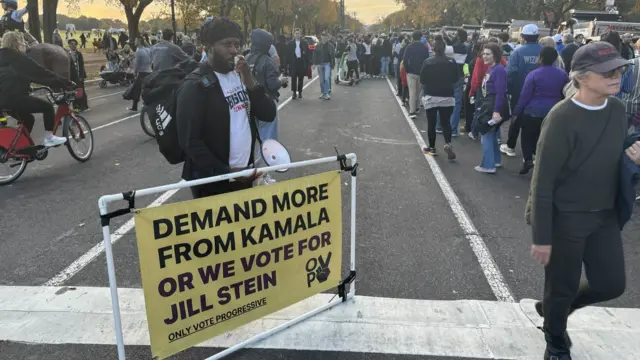
Polls suggest that Green Party candidate Jill Stein is drawing anti-war votes and could hurt Harris in several swing states
The love for Democrats in downtown DC this evening, where Kamala Harris’s rally is due to start shortly, may be ubiquitous – but it’s not universal.
Along the route to enter the rally, there are signs of dissent against the vice-president from pro-Palestinian protesters – from Wanted signs for “Killer Kamala” to posters calling for a ceasefire.
David, a Howard University student, says Harris must commit to an arms embargo with Israel to earn his vote.
“That’s all we’re asking for. We’re not asking for universal healthcare. We should be but we’re not,” he says.
David believes Green Party candidate Jill Stein will take away votes from Harris and cause her to lose. Some people here are engaging with him politely but others curse at him.
‘White dude 4 Harris’ urges men to see ‘jeopardy’ for women under Trumppublished at 23:15 Greenwich Mean Time 29 October
Sam Cabral
Reporting from Washington DC
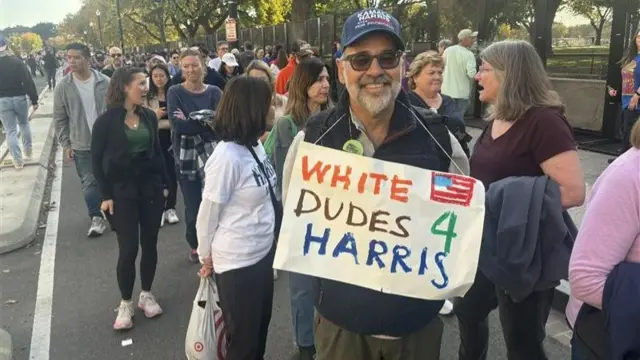
David, 64, is proudly a “White Dude For Harris” who believes she is “the best candidate right now”.
“It worries me that not enough men – and I think all men for that matter – are not recognising the jeopardy our women will be in if Trump is elected president,” he says.
“For white men, it’s about fear,” he goes on. “Trump has a way of getting people anxious about things that are really not in reality and fear motivates people.”
David tells me he wants to hear Harris talk about “an America that is multicultural, multi-ethnic, looks out for everybody’s interests and advances everybody in every way”.
Supreme Court rejects RFK’s effort to get off ballots in two swing statespublished at 23:15 Greenwich Mean Time 29 October
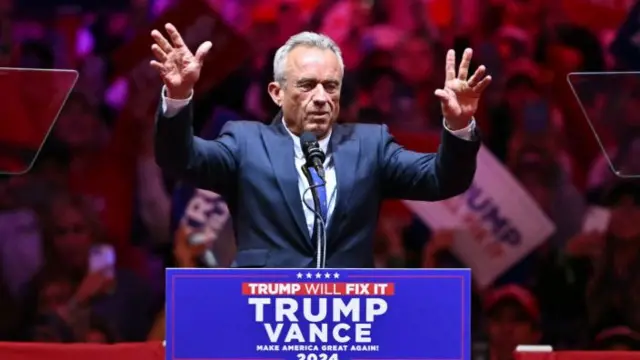 Image source, Getty Images
Image source, Getty Images
Now, we turn for a moment from the Allentown and Washington rallies.
The US Supreme Court has rejected two appeals from Robert F Kennedy Jr to have his name taken off presidential ballots in the swing states of Michigan and Wisconsin.
RFK, a former Democrat, gave up his independent bid for the White House in August and threw his support behind Trump. He has been fighting to have his name removed from several states’ ballots so as not to compete for votes with Trump.
He had asked the highest court in the land to force the battleground states of Michigan and Wisconsin to take his name off, arguing that leaving it on the ballots would amount to a violation of his First Amendment right to free expression.
Lawyers for the states, which could decide whether Trump or Democrat Kamala Harris becomes president, argued that it was too late to have his name removed, and that ballots had already been printed.
The rulings by the court’s majority did not give a reason for their rejection, which is common for emergency appeals. Last month, the Supreme Court rejected RFK’s to have his name added to the ballot in New York.
‘Puerto Ricans for Trump’ say they are not offended by rally remarkspublished at 22:59 Greenwich Mean Time 29 October
Will Grant
Reporting from Pennsylvania
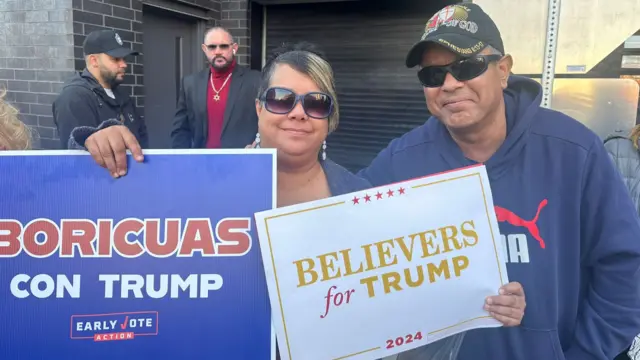 Image source, BBC / Will Grant
Image source, BBC / Will Grant
Among the Trump supporters winding their way into his rally in Allentown, are some holding signs which read “Boricuas con Trump” – meaning Puerto Ricans for Trump.
Two, Fermin and Saila, feel the controversy over offensive comments about Puerto Rico made by a comedian at Trump’s rally in Madison Square Garden is being blown out of proportion.
“Trump doesn’t feel that way about Puerto Rico, there’s no discrimination,” says Fermin, insisting the former president consistently showed respect for the US territory and that he did not mishandle the federal response to Hurricane Maria in 2017.
They blame the island’s government, and not Trump, for Puerto Rico’s problems.
Saila believes a second Trump administration would benefit Latinos in the US more generally – through greater prosperity, lower prices and controlling undocumented immigration at the southern border.
“He doesn’t want to get rid of all migrants,” Saila says, adding she thinks that he wants immigrants to come into the country legally, to work and to not commit crimes.
No one carrying the Puerto Ricans for Trump signs seems to think the disparaging joke would harm his campaign.
“I prefer someone like him who tells you things as they are and doesn’t stab you in the back”, adds Fermin.
Trump in majority-Latino part of Pennsylvania for key rallypublished at 22:44 Greenwich Mean Time 29 October
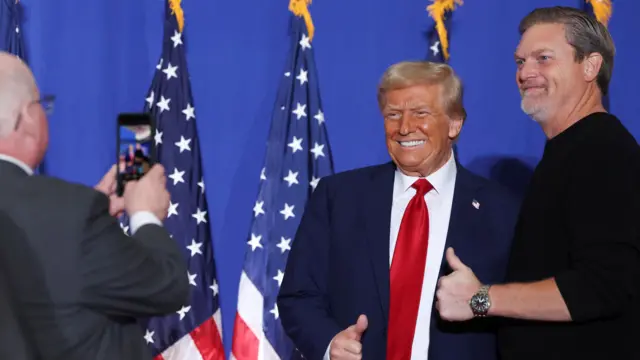 Image source, Reuters
Image source, Reuters
After speaking at a press conference at his home in Florida, Trump travelled to Pennsylvania in his effort to win over the Keystone State, one of the states that will decide the election.
Now we’re expecting him to hold a rally in the city of Allentown, due to begin at 19:00 EDT (23:00 GMT).
Allentown’s schools were shut earlier in the day and residents warned by police to stay away from downtown due to increased foot traffic.
Trump’s visit to a majority-Latino region comes amid a continuing backlash to derogatory comments made about Puerto Rico by one of the speakers at his Madison Square Garden on Sunday.
This afternoon he spoke at a roundtable discussion in the Philadelphia suburb of Drexel Hill. He was more than 40 minutes late to the event, so the rally could also be delayed.
Pennsylvania: At a glance

Crowd gathers in Washington for Harrispublished at 22:28 Greenwich Mean Time 29 October
Samira Hussain
Reporting from Washington DC
At the Ellipse – a huge stretch of grass close to the White House in Washington DC – where the crowd is awaiting the arrival of Harris, who will deliver her final message of the campaign, a DJ is spinning tunes, hyping up the crowd.
About 20 minutes ago, cheers went up as the MC announced just 90 minutes before the vice-president takes the stage.
Harris’s motorcade just drove by in downtown Washington DC.
She eventually is heading toward the Ellipse. Downtown DC is at an absolute standstill, most roads down have been closed either for her or for the crowds waiting to get in to the rally.
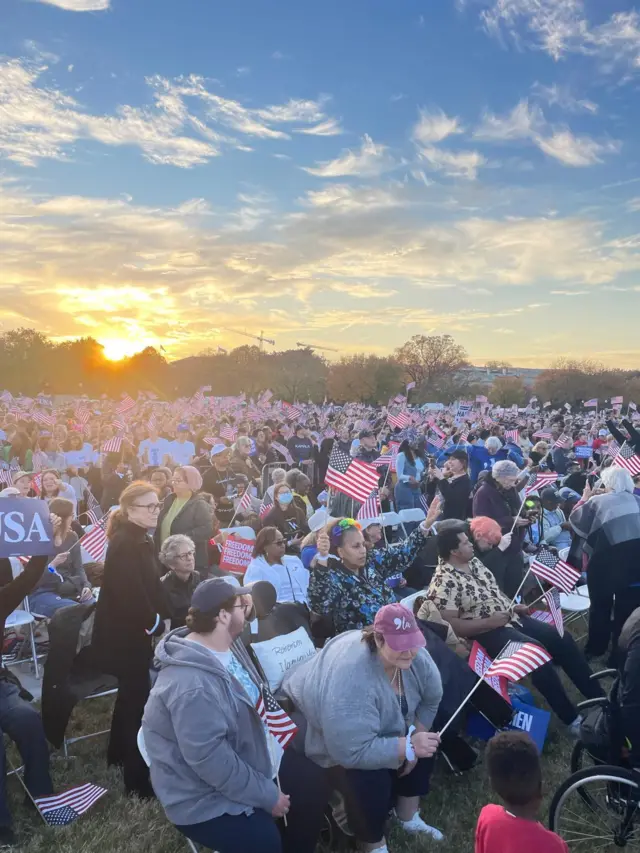
German tourists say they are ‘hoping for the best’ as election nearspublished at 21:36 Greenwich Mean Time 29 October
Sam Cabral
Reporting from Washington DC
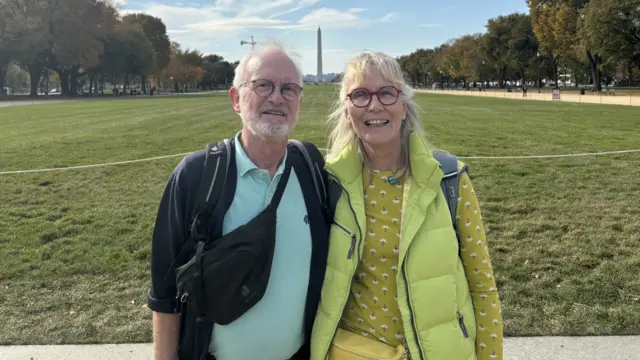
My colleagues have been bringing you the international view of the US election today, while I’ve been down at the National Mall speaking to voters and Washington DC visitors ahead of Kamala Harris’s speech here tonight.
A little earlier, I ran into Christiane Kammerlander and Jürgen Appeldorn, two tourists visiting from Germany and exploring the National Mall area this afternoon. They also have their own view of how the US election is being seen from abroad.
Christiane says most Germans are “shocked” by the political strength of Donald Trump but expect that Kamala Harris will ultimately prevail: “We are hoping for the best.”
Trump “can’t be trusted, can’t be believed”, she tells me.
“He’s used his voice to destroy so many things: the negotiations with Iran, discussions with political leaders… I will never trust him,” she says.
“German politics is boring – but I prefer boring,” she adds.
How the US election is being viewed around the worldpublished at 21:31 Greenwich Mean Time 29 October
Dulcie Lee
Live editor, in Washington DC
We’ve been hearing from our correspondents about how the US election is being viewed from countries across the world and by international communities within the United States.
We’re about to move to the latest news – Trump has been campaigning today in swing state Pennsylvania after appearing at his Mar-a-Lago residence in Florida, while Kamala Harris is set to present her closing argument to voters here in Washington DC this evening – but first, catch up with the global perspective on this race:
- From the UK, our political editor Chris Mason runs through how the country is preparing for a new president
- In Russia, Moscow is watching two candidates with very different views on Ukraine, our Russia specialist Francis Scarr explains
- Traditionally, Iran has viewed Democrats and Republicans as cut from the same cloth – but beneath the surface it’s more complex, BBC Monitoring’s Sarbas Nazari says
- In Israel, Benjamin Netanyahu hasn’t hidden his appreciation for Trump – but political insiders see him as unpredictable, Middle East correspondent Lucy Williamson writes
- Mexico‘s first female president Claudia Sheinbaum says she doesn’t mind who wins – but most Mexicans don’t share her ambivalence, Mexico correspondent Will Grant says
- Our BBC Arabic correspondent says that tor many Arab American voters, the war in Gaza, and now Lebanon, has been a turning point in the US elections
- In Kyiv, Ukraine correspondent James Waterhouse says officials and ordinary people alike are wondering how an election 5,000 miles away will affect their lives as they face down another winter at war
- And north of the border, Justin Trudeau’s government is taking the US-Canada relationship very seriously, as it remains vital for Ottawa’s prosperity and security
The BBC’s chief international correspondent Lyse Doucet has taken a zoomed-out view, examining in-depth multiple facets of how the outcome of the US election could affect regions around the world – including matters of war and peace, the global economy and climate change.
You can also catch up with the latest season of the BBC’s The Global Story podcast, which is looking at the United States’ relationship with countries around the world. If you’re listening in the UK, listen on BBC Sound. If you’re outside the UK, listen wherever you get your podcasts, external.
There’s lots more to come, so stick with us.
‘We need Donald Trump as the president’ – South Asian American voter in Indianapublished at 21:28 Greenwich Mean Time 29 October
Bertin Huynh
BBC Asian Network News

When Rajagopal Chellapilla reflects on the Biden-Harris administration, he describes the policies as “disastrous”.
“The mishandling of the southern border and the current state of the economy…” the Republican voter tells BBC Asian Network News. “I feel like for the progress of this nation, we need Donald Trump as the president.”
For many South Asians in the US, there’s often been a feeling of pride seeing Kamala Harris as a candidate of South Asian heritage – a first ever in history.
But Rajagopal, from Indiana, says he doesn’t share in that.
“When Vivek Ramaswamy was running [to be Republican nominee], that did make me proud,” he says .“It’s because of who they are, what they stand for and what their policies are.”
Ukraine’s future to be shaped by a US vote 5,000 miles awaypublished at 21:15 Greenwich Mean Time 29 October
James Waterhouse
Ukraine correspondent in Kyiv
 Image source, Getty Images
Image source, Getty Images
On November 5, whether they know it or not, Americans will be voting on Ukraine’s future.
Here in the capital Kyiv, there is a palpable flurry of diplomatic activity as officials try to secure as much military aid as possible from the outgoing Biden administration.
“We should be pretty worried,” Dr Evelyn Farkas, a former US national security advisor says on her visit. “Donald Trump is not a friend of Ukraine; he thinks he’s a friend of Vladimir Putin’s.”
While Kamala Harris – the clear favourite here – has suggested military aid would continue if she emerged the victor, it’s looking less likely to be sustained under a second term for Donald Trump.
However, across Ukraine’s south and east, we find a growing number of people who want the war to end immediately – and some even see a Donald Trump presidency as the best chance of bringing respite.
In October, the Russian army advanced 478 square kilometres into Ukrainian territory, a record since March 2022, according to analysis from the AFP news agency.
Ukraine is on the back foot, and with North Korea’s deepening involvement, there is a sense of urgency not seen since March 2022 either.
Canada looks towards preserving US trade relationship, no matter election winnerpublished at 21:02 Greenwich Mean Time 29 October
Jessica Murphy
BBC News, Toronto
In January, well ahead of the US election, Prime Minister Justin Trudeau launched Team Canada 2.0 – a soft power strategy to remind American lawmakers of the critical role the country plays in the US economy.
You may never have heard of the Team Canada approach – unless you’re a state politician or Washington DC lawmaker with a stake in cross-border trade. Then Ottawa hopes you may even be a little sick of Canadian trade envoys knocking at your door telling you that US-Canada goods and services trade is worth more than $908bn annually.
It’s a sign of how seriously Canada is taking the US election when the cross-border relationship is vital to its prosperity and security.
Trudeau’s government was able to navigate the renegotiations under Donald Trump of the North American Free Trade Agreement, now called the USMCA, in part due to the first Team Canada initiative, despite a tense Trudeau-Trump relationship.
Now there is fresh concern over the Republican candidates promise to bring in 10% tariffs – a potential disaster to trade. If Trump wins, Canada is also expected to face significant pressure to ramp up its Nato spending.
Kamala Harris has been less specific about her trade policies, though she is widely expected to maintain the current relationship.
While Trudeau’s Liberals – and many Canadians – are more politically aligned with the US Democrats, they have said they will be ready for whatever happens after 5 November.
The students helping Americans vote abroadpublished at 20:55 Greenwich Mean Time 29 October
Andrew Rogers
BBC Newsbeat, reporting from Edinburgh

Julia, Cylus and Illenia are American students studying at the University of Edinburgh and have been trying to encourage and help Americans abroad register their ballots.
They’ve held voter registration stalls, been in pub quizzes and had watch parties of the debates.
Cylus, from Massachusetts, feels it’s important for Americans abroad to exercise their right to vote.
“We’ve [normally] had bad turnout outside the US. And that’s a real shame, especially when we have such an important election,” he says.
Julia feels people “are interested” seeing their information. “Everyone’s really friendly, and we haven’t had anything hostile,” she says.
For Illenia, it’s also been a chance to meet people from home.
Despite being Democrat supporters themselves, they say their stall is just to help people register from all political affiliations.
“We just want everyone to know that they can vote,” Illenia says.
“It’s just our way of helping our own country while we’re not living there,” Cylus adds.
Chinese American scientists call for fight against racial discriminationpublished at 20:53 Greenwich Mean Time 29 October
Sylvia Chang
BBC Chinese, reporting from Pennsylvania
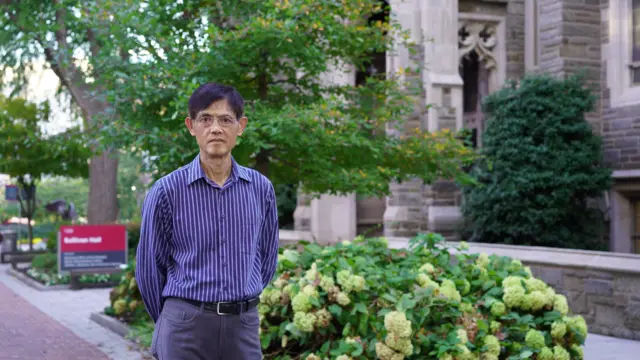
No matter who they vote for, “Chinese Americans should unite together to fight against racial discrimination,” says Dr Xiaoxing Xi, a Chinese American professor of Physics at Temple University in Pennsylvania.
In 2015, this world-renowned expert in superconducting technology was arrested by the FBI. He was accused of aiding Chinese entities in advancing their position in the field. Although all charges were dropped four months later, the incident changed Xi’s life. He is now suing the government and advocating against racial profiling.
Xi is one of multiple Chinese American scientists facing rising US-China tensions. Many believe they have become scapegoats amid geopolitical strife, especially since the launch of China Initiative in 2018, a controversial program aimed at curbing economic espionage and trade secret theft by China.
The US Department of Justice ended the program in 2022, recognising it had fostered racial profiling. However, there are legal efforts in Congress to reinstate it.
Although the bill is unlikely to advance in the current Democratic-controlled House, the upcoming elections might change the situation.
African asylum seekers anxious ahead of electionpublished at 20:29 Greenwich Mean Time 29 October
Kaine Pieri
BBC Africa
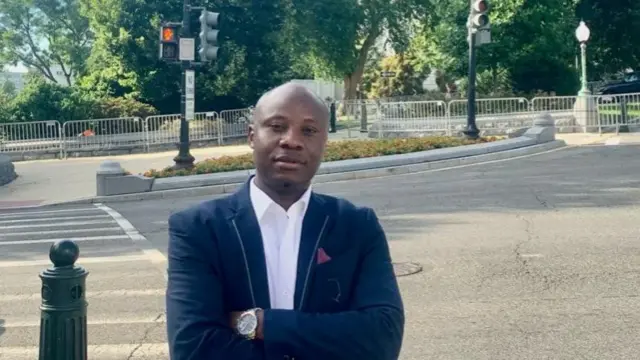
As the US election approaches, the stakes are high for African asylum seekers whose futures may hang in the balance.
The number of African migrants reaching the US-Mexico border has surged over the last few years, as they flee persecution and poverty, with many facing imprisonment or worse if forced to return home.
“We deserve safety, we see our politicians demonise our community,” says Dr Yves Kaduli, a Congolese asylum seeker living in Virginia awaiting a decision on his case.
A Trump win could mean mass deportations and a return to strict border policies, while Harris has vowed a “faster, fairer” asylum process as she vows to resurrect a failed bipartisan border bill that faces criticism from human rights advocates.
The view from Ukrainians in a key swing statepublished at 20:14 Greenwich Mean Time 29 October
Zhenya Shidlovska
Ukraine correspondent, reporting from Pennsylvania
At an autumn fair outside a Ukrainian church in Philadelphia, Pennsylvania, I spoke to Maryana Babirad who was helping out at a food stall with her husband and three children.
They fled the war in their native Ukraine seven months ago for the US.
“It was the hardest decision,” she said, fighting back tears.
Several Americans with Ukrainian heritage at the event told me they are deeply concerned about Donald Trump’s plans to seek a swift end to the Ukraine-Russia conflict, which they fear could see Kyiv being pressured to give up territory to Moscow.
Democrats across the state are hoping this sentiment will help them appeal to the 120,000 Ukrainian-Americans in Pennsylvania, who have traditionally leant towards conservative candidates, to back Kamala Harris.
With the race in this battleground state on a knife-edge, issues like this could make a crucial difference.
Pennsylvania: At a glance

Mexico’s president doesn’t mind who wins – but what about her citizens?published at 19:54 Greenwich Mean Time 29 October
Will Grant
Mexico correspondent
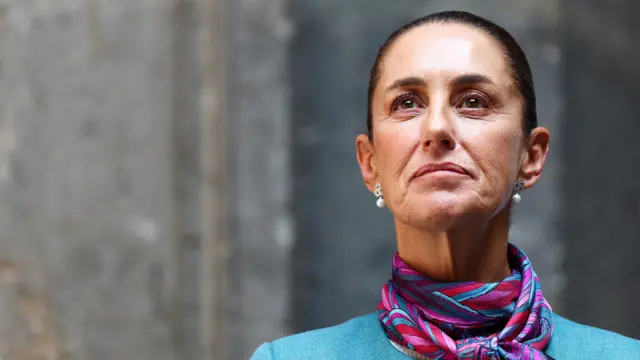 Image source, Reuters
Image source, Reuters
During the recent Mexican campaign, the eventual winner Claudia Sheinbaum – today Mexico’s first female president – told the BBC she didn’t mind who won the US election.
She said she would be ready to work with whoever wins and would “defend Mexicans always” in the face of any hostility, especially in their vital trade relationship.
With the United States-Mexico-Canada free trade agreement up for renewal in two years, there is some potential for a clash of heads with Washington on shared issues of trade, undocumented immigration or illegal fentanyl trafficking.
Yet most Mexicans don’t share President Sheinbaum’s apparent ambivalence. A recent poll suggested a little over two-thirds of Mexicans would prefer Kamala Harris to be the next US president, attracted to the idea of the first women leaders on both sides of the border.
And many Mexicans don’t remember the Trump years very fondly either. Trump’s language and political rhetoric – in which some Mexican immigrants were called “rapists” and “murderers” from the very start of his campaign – did not endear him to his neighbours to the south.
The complex view from Iranpublished at 19:38 Greenwich Mean Time 29 October
Traditionally, Iran’s position has been that Democrats and Republicans are both cut from the same cloth and neither would impact policy.
But underneath the surface, the result of the US election could have complex impacts on Iran.
With ongoing conflict in the Middle East, economic sanctions, and questions swirling around its nuclear power, there is plenty at stake for the nation.
Iran has been accused of targeting both candidates with hacking and disinformation, claims it has denied.
Our colleague Sarbas Nazari talks through the view from Iran in this two-minute clip:
What the world wants from the US election: The view from Iran
The view from Israel: Who does Netanyahu want to win?published at 19:17 Greenwich Mean Time 29 October
Lucy Williamson
Middle East correspondent in Jerusalem
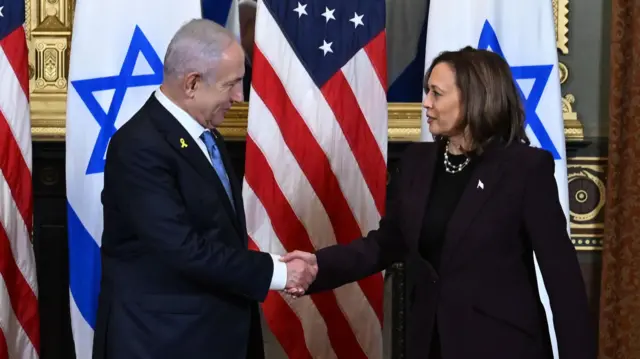 Image source, EPA
Image source, EPA
Netanyahu met Harris when he came to the US in July
Israel’s prime minister, Benjamin Netanyahu, has not hidden his appreciation for Donald Trump – and polls suggest he’s not alone.
Recent surveys suggest around two-thirds of Israelis would prefer to see Donald Trump in the White House.
Trump already has a solid track record of backing Israel. The last time he was president, he upended half a century of US policy – and wide international consensus – by recognising Israel’s territorial claims to the Golan Heights, captured from Syria in the 1967 war.
He also earned points with Netanyahu, by recognising Jerusalem as Israel’s capital, brokering normalisation agreements between Israel and several Arab countries, and scrapping the Iran nuclear deal.
But political insiders in both Israel and the US also see Donald Trump as unpredictable, reluctant to involve America in foreign conflicts, and prone to ad-hoc deal-making.
That could mean less pressure over humanitarian issues, says former Israeli ambassador to the US, Danny Ayalon, but it could also mean other kinds of pressure, including over military aid.
“There’s no doubt that he would support Israel and send everything it needs, but unlike Biden, he may charge for it,” he said, referencing Trump’s insistence that Nato countries pay “their fair share” for defence.
Israel has received staunch political and military support from Joe Biden, but Ayalon says the current Democratic president is judged by his public differences with Israel, and by the marked absence of a White House invitation for Netanyahu.
How Russia is treating the US election – in two minutespublished at 19:02 Greenwich Mean Time 29 October
Let’s turn now to some global perspectives on the race for the White House.
Kamala Harris and Donald Trump have very different outlooks on the war in Ukraine – the issue Russia is most focused on in the US election.
BBC Monitoring’s Russia specialist Francis Scarr runs through how the Kremlin and the country’s media are treating this election:
Watch: The view from Russia – in two minutes
